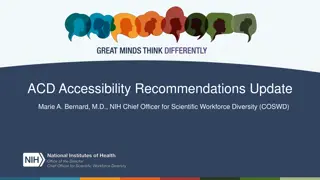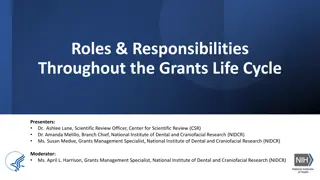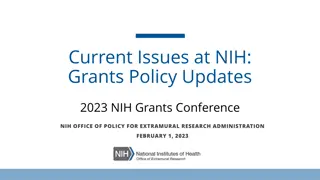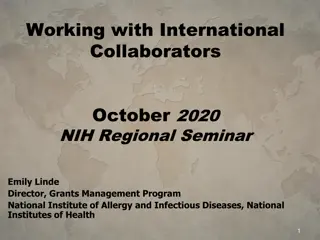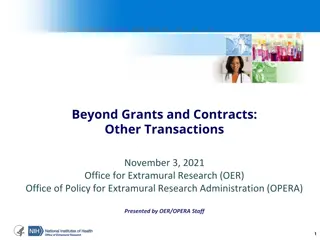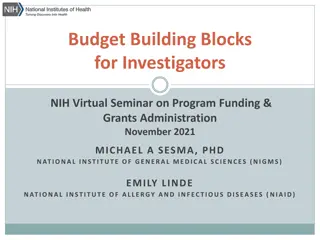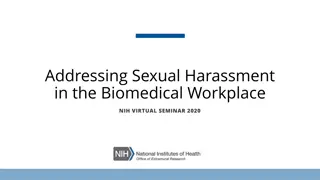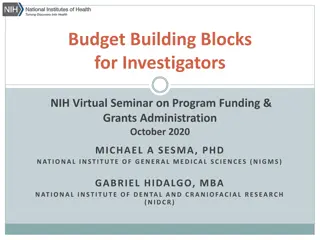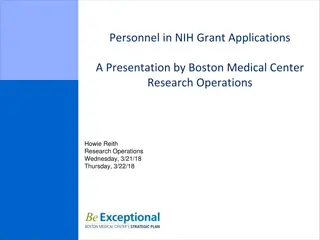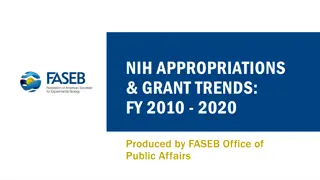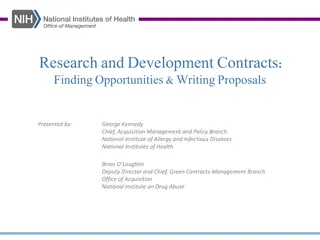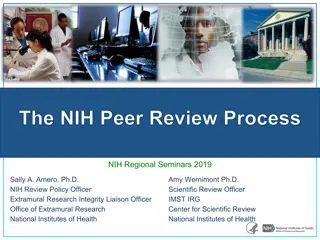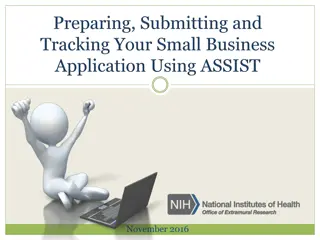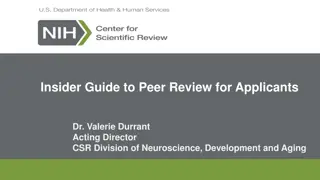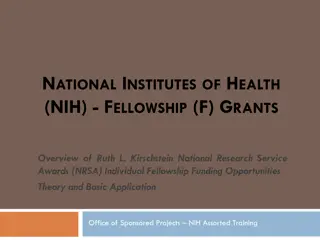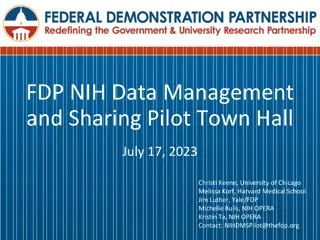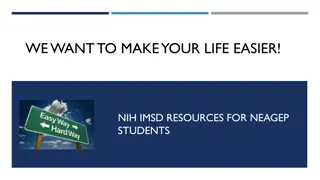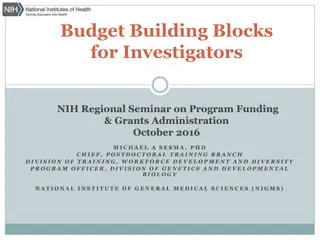Understanding NIH Funding Opportunities and Processes
This session introduces attendees to NIH funding opportunities, providing insights on working effectively with NIH to secure grants for health-related research. Learn about the mission of NIH, types of grants available, NIH Institutes & Centers, and grant review criteria. Gain valuable information to enhance your capacity in pursuing funding for research projects.
Download Presentation

Please find below an Image/Link to download the presentation.
The content on the website is provided AS IS for your information and personal use only. It may not be sold, licensed, or shared on other websites without obtaining consent from the author. Download presentation by click this link. If you encounter any issues during the download, it is possible that the publisher has removed the file from their server.
E N D
Presentation Transcript
Getting to Know National Institutes of Health (NIH) Funding Opportunities
This roundtable session aims to build attendees capacity to work effectively with NIH, thereby increasing the likelihood of funding health-related research. Overview 1. Introductions and NIH General Information 2. Panel Discussion 3. Q&A 4. Planning Ahead Panelists: Successful NIH Applicants Dr. Katharine Stewart, Vice Provost Faculty Affairs Dr. Sarah Desmarais, Associate Professor of Psychology Dr. Laura Widman, Assistant Professor of Psychology Moderator: Dr. Jeni Burnette, Assistant Professor of Psychology Co-hosted by the NC State College of Humanities and Social Sciences & the Social Behavioral Health Research Group.
Mission of the NIH To seek fundamental knowledge about the nature and behavior of living systems and the application of that knowledge to enhance health, lengthen life, and reduce illness and disability. Conducts and supports research in: the causes, diagnosis, prevention, and cure of human diseases; the processes of human growth and development; the biological effects of environmental contaminants; the understanding of mental, addictive and physical disorders; directing programs for the collection, dissemination, and exchange of information in medicine and health.
NIH Institutes & Centers 21 Institutes National Cancer Institute (NCI) National Institute on Aging (NIA) National Institute on Alcohol Abuse and Alcoholism (NIAAA) National Institute of Child Health and Human Development (NICHD) National Institute on Drug Abuse (NIDA) National Institute of Mental Health (NIMH) National Institute on Minority Health and Health Disparities (NIMHD) 6 Centers Fogarty International Center National Center for Advancing Translational Sciences Center for Scientific Review
Types of NIH Grants R Investigator initiated research grants K Career development awards F Individual fellowships F31=predoc; F32=postdoc T Institutional training grants L Loan repayment P Research program projects/centers SBIR Small Business Innovative Research
Grant Review Criteria R grants Significance, Investigators, Approach, Innovation, and Environment K grants Candidate, Career Development Plan/Mentoring Plan, Research Plan, Mentors/Co-mentors/Consultants, and Environment/Institutional Support for Candidate F grants Fellowship Applicant, Sponsors/Collaborators, Research Training Plan, Training Potential, and Environment/Institutional Support for Applicant
Sample R grants R01: Research Project Grant Program (R01) Support discrete, specified, circumscribed research projects for 3-5 years No budget limit unless specified in FOA (generally $500k/yr in direct costs) R03: Small Grant Program Support small projects, including: pilot or feasibility studies, collection of preliminary data, secondary analysis of existing data, small, self-contained research projects, etc. Limited to 2 years up to $50,000 per year in direct costs R21: Exploratory/Developmental Research Grant Award Encourages new, exploratory, and developmental research projects up to 2 years Providing up to 2 years of support for early stages of project development. Combined budget for direct costs for the two year project period $275,000. R34: Clinical Trial Planning Grant Permits early peer review of the rationale for the proposed clinical trial and support development of essential elements of a clinical trial Project period of 1-3 years with budget ~$100k/year, but up to $450k total direct costs
Sample K grants K08: Mentored Clinical Scientist Research Career Development Award Provides support and protected time to individuals with a clinical doctoral degree for an intensive, supervised research career development experience in the fields of biomedical and behavioral research, including translational research. K23: Mentored Patient-Oriented Research Career Development Award Supports supervised study and research for clinically trained professionals who have the potential to develop into productive, clinical investigators focusing on patient-oriented research. K99/R00: NIH Pathway to Independence (PI) Award Provides support for individuals ready to transition to an independent research career.
Sample F Grants F31: Ruth L. Kirschstein National Research Service Awards (NRSA) for Individual Predoctoral Fellows Enables promising predoctoral students to obtain individualized, mentored research training from outstanding faculty sponsors while conducting dissertation research. Proposed mentored research training is expected to clearly enhance the individual s potential to develop into a productive, independent research scientist. F32: Ruth L. Kirschstein National Research Service Awards (NRSA) for Individual Postdoctoral Fellows Provides support to promising Fellowship Applicants with the potential to become productive, independent investigators in scientific health-related research fields relevant to the missions of participating NIH Institutes and Centers
Panelists Discussion Writing and Building Relations
General Info Grants are peer-reviewed by three experts on study section Study section membership online Only half of grants receive a score and get discussed Lower scores = better scores The rest get feedback from 3 reviewers Depending on mechanism, success rate around 7-20% The review process is slow Best case is 9 months from submission to award notification Add at least 3-6 more months if you have to resubmit You can reapply (up to) 1 time with same idea to same institute
Timeline & Next Steps Grants accepted 3 times per year Dates differ across funding programs Find and contact program officer ASAP Early in planning stage Throughout design and writing process Notify H&SS Research Office as soon as you know that you will be applying Subcontract/consortium arrangements finalized at least 2-3 weeks prior NIH deadline Full proposal should be submitted to H&SS Research Office two weeks before NIH deadline Routed through university for approval Uploaded into NIH s electronic Research Administration (eRA)
Additional Resources Good summary videos from NIH: https://www.youtube.com/watch?v=rNwsg_PR90w (15m overview) https://www.youtube.com/watch?v=lAOGtr0pM6Q (4 mins tips) NIH-funded projects in RePORTER https://projectreporter.nih.gov/reporter.cfm NIH application guide https://grants.nih.gov/grants/how-to-apply-application-guide.html





